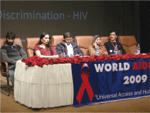National AIDS Control Program (NACP) Islamabad under the auspices of the Ministry of Health (MoH) as part of its month-long campaign to celebrate ‘World AIDS Day’ arranged a seminar at a local hotel in Islamabad.
The aim of the seminar was to engage all stakeholders to control the HIV/AIDS epidemic throughout the world and to mark the ‘World AIDS Day.
Dr. Rasheed Jooma, Director General Health, Ministry of Health, Islamabad speaking as the Chief Guest on the occasion said that Ministry of Health through National AIDS Control Program is utilizing all the channels of communications to create awareness among the masses about the HIV/AIDS prevention.
He further said that the theme of this year World AIDS Day is Universal Access and Human Rights, which is related to the importance of the treatment as it is everyone right.
He stressed the need to address the issue of using unsafe syringes as these are being used in large quantum in Pakistan. According to independent statistics 1.2 billion syringes are used per annum in Pakistan. The main reason for spreading hepatitis B, C and HIV/AIDS in the country is the use of unsafe syringes.
Qasim Iqbal, PLWHAs representative said that HIV attacks the body while stigma attacks the soul. The body can be repaired but the injured soul may take a lifetime to heal. Unlike the US and India, Pakistan does not allow HIV positive people to enter its territory, leave alone migrate to this country.
Dr. Hasan Abbas Zaheer National Programme Manager, NACP on the occasion said that over the past few years, despite many consistent efforts of the government, the rate HIV infection in Pakistan has increased significantly and has moved from a low to concentrated epidemic with prevalence of more than five percent among injected drug users (IDUs) in eight major cities of Pakistan.
However, the country still has a window of opportunity as the current situation, using different prevalence estimation models, indicate that the HIV among general adult population is still below one percent i.e. 97,400 cases, he added.
Sanaullah, an IDU from Sargodha shared his views about exclusion from his family and job termination after he got addicted.
Manzoor Iqbal, a migrant worker from UAE, who has been afflicted with the epidemic for the last ten years, pointed towards the need for immediate counseling, health care service and alternative work for the sufferers.
Nargis, a female sex worker, said the stigma was more extensively directed against women than men.
It prevents women coming forward for conducting tests and reduces their choices in terms of healthcare and family life.
Shafiqur Rehman, another HIV positive who was sacked from service after he tested positive for HIV, said the illness had to be accepted as a disease, not a punishment. He regretted that discrimination against HIV positive patients was practiced everywhere.

